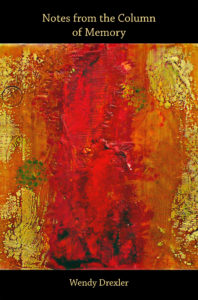 Review by Ruth Hoberman
Review by Ruth Hoberman
Wendy Drexler’s latest collection of poems, Notes from the Column of Memory, addresses the bewilderment and wonder involved in aging. Inspired by Donna Conklin King’s sculpture of the same name, the title poem opens, “See how time breaks us/and still we stand/among the flutings.” Shaped like a column, with its short, centered lines that widen at the base, and itself broken into two parts (part one in the book’s first section, part two in its last), the poem invites us to see “your own face, fractured/but reclaimed, called back/to your history and your home.”
This reclaiming of fragmented memories drives the book and makes it—for this seventyish woman at least—a riveting and rewarding read. Who do we become as we age—with our changing faces and familial roles? And how do we deal with the decades and decades of haphazard memories time throws at us?
Drexler’s book is divided into five sections. At its core, constituting the third section, are seven sonnets about the speaker’s mother. The sonnets form a “crown”: the last line of each sonnet is repeated as the first line of the one that follows. The result is haunting, suggesting the way life repeats itself through memory and regression. And with whom do we regress more than with our mothers—even when they’ve been dead for forty years? “Closing my eyes, I smell your geraniums, the ones/with leaves like tongues, their ruddy scent.” This immediacy is particularly poignant juxtaposed with the memory of estrangement: “How hard you were trying to love your daughter./What trouble we had, what turbulent water.”
The sonnets take their title—“Burial of a Woman with the Blackened Shells of 86 Tortoises”—from a 12,000 year-old tomb whose contents remind us that humans have been treating animals badly for a long time. “Must we kill, need we sever,” the speaker asks in one of the sonnets, “to turn ourselves golden and forever?”
Poems about turtles, fish, screech owls, smashed groundhogs, and lucky rabbits’ feet insist on the otherness of wild animals even as they depict our tendency to project our needs onto them. In “Hurling the Menhaden,” the speaker throws beached menhaden back into the ocean where bluefish are chasing them, in a muddled, desperate effort—to save them? to save herself? to express her rage and guilt at chains of causality she “can’t/see the end of”?
Another poem depicts carp in all their strangeness: “Sheathed in the pulse/of sinew and nerve, they are precisely/carp. Fleshy wet. Sweep and shimmy.” The lines twist across the page like fish slipping from our hands: “Haven’t you, too,” the poem concludes, “tried to hold a river/to your ear to hear the wild roar of what is?”
This “wild roar” can be hard to hear amid the receding glaciers and road kill. But humans deserve our sympathy too—those “little souls” made of “brine,” each encased in a car, creating a “Traffic Jam on the 405 North.” In “The Raccoon,” after all, the speaker notes “his enterprise so distant from mine—or was it?—/nipped at the shadowland between what I knew/as fear and what I claimed as love.” There’s a wrenching honesty in these poems—a fascination with the truth of things, whether it’s a crushed groundhog or the complexity of mother-love, the “hustle of tart and sweet/so sharp it hurt,” she calls it in “Oranges.”
Drexler’s poems shift in form and tone, embracing ambivalence and a droll humor as they move, in the book’s final section, toward mortality. One of my favorites is “Apology to My Ovaries,” which uses a series of metaphors—gardener, stockpot, pantry, arbor—to celebrate (and mourn) the speaker’s ovaries. If she is to survive, she must expel this body part so “deep in the mine of me.” I was reminded of Sharon Olds’s odes to clitoris and hymen and Lucille Clifton’s “poem to my uterus.” Drexler’s speaker is similarly chummy and sympathetic as she addresses her ovaries. But when, in the book’s final section, she addresses her BRCA gene,”lying/ in wait, trying to kill me,” she’s all defiance: “Take my ovaries—they’re nothing/to me now. . . .And keep your goddamned devil’s hands/off my daughter, my granddaughter…”
Or maybe not all defiance. There’s acceptance too. “Oh, little ripcord on my parachute,/I know we’ve tied the knot.” But thank you for not killing me yet, she says. “Let’s float gently, together, all the way down.”
Notes from the Column of Memory by Wendy Drexler
Terrapin Books. 2022 $17.00 [paper]
ISBN: 9781947896567
Ruth Hoberman is a professor emerita of English at Eastern Illinois University. Since her 2015 retirement, her poems and essays have appeared in such journals as Smartish Pace, RHINO, Comstock Review, Michigan Quarterly Review, and Ploughshares.
